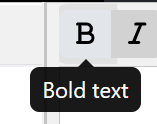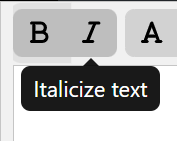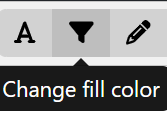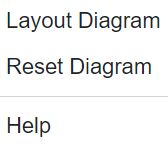Package Diagram Modifications & Settings
We'll review the editing options and settings for the Package Diagram and its constructs.
| Package (Asset) Editing | Review of the editing options for a Package construct. |
| Path Editing | Review of the editing optons for Paths. |
| Multiple Packages Selected Editing | Review of the editing options when multiple entities are selected. |
| Package Diagram Settings | Review of the Package Diagram Settings. |
The previous article on the Package Diagram provides users with an introductory explanation of the constructs and their functionality on the diagram canvas. In the following section, we will delve into more detail about the options available for the canvas constructs connections and the toolbar frame options that change dependent on the selected constructs and the Package Diagram's settings.
Package (Asset) Editing

Upon selecting a Package on the canvas, users are presented with the options below.

Below we will explore the editing capabilities provided for a Package.
Bold

This option will Bold the name of the Package construct selected on the canvas.
Italicize

This option will Italicize the name of the Package construct selected on the canvas.
Change Text Fill Color

Using the HTML Color Picker that drops down from the Text Fill Color Option, users can change the text color of the Package selected on the canvas by selecting the color associated close to the desired color simply inputting in the HEx, RGB fields with the proper codes and numbers.
Change Fill Color

Using the HTML Color Picker that drops down from the Text Fill Color Option, users can change the color of the Package construct on the canvas.
Change Stroke/line color

Using the HTML Color Picker that drops down from the Change Line/Stroke Color Option, users can change the color that borders the Package construct on the canvas.
Reset Color back to default

The Reset color back to default option will change the Package construct selected on the canvas back to the default gray and black colors.
Path Editing

When users select a path that connects the Package constructs, they are presented with various editing options. An example of these otions can be seen above, and the following options are provided and explained below.
![]()
Change Stroke/line color

Using the HTML Color Picker that drops down from the Change Line/Stroke Color Option, users can change the color of the Path selected on the canvas.
Reset Color back to default

Users may reset the Path's color back to the defaulted black.
Line Options

User may modify the selected Path to be Orthogonal or Straight (if orthogonal).
Paths

With the Paths dropdown, users may change the Path type to the selected line on the canvas.

All path options displayed above, except for containment, are dashed arrowed lines with a label to help users differentate between the specific path type.
![]()
A solid line with the circled plus indicator represents a containment path. The circled plus indicator will be placed on the Parent Package.
Multiple Packages Selected Editing

Users may drag their cursor outside of the constructs and a box will appear to select as many multiple Packages the user desires. Many features on the top toolbar will appear upon doing so for the user to utilize. Let's go over each option as highlighted below.

Bold

This option will Bold the names of the selected Packages on the canvas.
Italicize

This option will Italicize the name of the selected Packages on the canvas.
Change Text Fill Color

Using the HTML Color Picker that drops down from the Text Fill Color Option, users can change the text color of the multiple Packages selected on the canvas by selecting the color associated close to the desired color simply inputting in the Hex, R,G,B fields the proper codes and numbers.
Change Fill Color

Using the HTML Color Picker that drops down from the Change Fill Color Option, users can change the color of the multiple Packages selected on the canvas.
Change Stroke/line color

Using the HTML Color Picker that drops down from the Change Stroke/Line Color Option, users can change the color that borders the multiple Packages selected on the canvas.
Reset Color back to default

The Reset color back to default option will change the entity selected on the canvas back to the default gray and black colors.
Align Vertically

This selection will align the constructs vertically for the multiple Packages selected on the canvas. The vertical line will start with the highlighted green Package, as shown below.

Align Horizontally

This selection will align the constructs horizontally for the multiple Packages selected on the canvas. The horizontal line will start with the highlighted green Package, as shown below.

Clone

The Clone Shape option is to bring size uniformity to the diagram's constructs. When this option is selected, the green highlighed entity will be what the other Packages clone to so they are all the same size.
Package Diagram Settings

The above Package Diagram Settings is the wrench icon on the top right of the toolbar frame. This button is a fixed dropdown and does not change dependent on what the user has selected. Now, let's explore the wide range of options that are available in this dropdown menu.
Levels

The settings dropdown provides users the option to display up to 10 levels of decomposition in a Package Diagram. When not in the dropdown, note the blue box to the left of the wrench icon, indicates how many levels are selected and displayed in the diagram.
Cross-Project Indicators
![]()
If using Cross-Project Relationships, users may show or hide indicators on the entities being pulled in from other projects.
SysML Frame Edits
![]()
⚠️The SySML Frame is the green space the model is placed on in the canvas.

The Edit SysML Frame option will bring up the following modal.

Users may select the color of the frame with the  button indicated in green (the green color on the button will change to whatever color a user sets it to). Users may also bring the SysML frame back to the defaulted green with the reset option
button indicated in green (the green color on the button will change to whatever color a user sets it to). Users may also bring the SysML frame back to the defaulted green with the reset option  .
.
The additional options on the modal are related to the text displayed at the top left of the SysML frame, called the Diagram Header, as shown in the example below.

The changes made to the Select SysML Diagram option in the Modal refer to the Model Element Type (ex. [Activity] in the picture above). Note, the example above is from a Package Diagram but shows the Activity option. Therefore it is important to note, users may select a different diagram type here, even if you're in a different diagram. The text in the header will change but this option will not change the diagram itself.
The Select Parent option in the modal is a dropdown to select the Parent entity for the Model Element Name. This will change the text in between the bracketed texts. In the example above it is the 'Model' text.
Hide/Show SysML Frame
![]()
Users may use this option to hide (or show, if hidden) the SysML Frame as they wish.
Layout, Reset Diagram & Help
Lastly, the final options provide users to reset their diagram changes and layout the diagram from changes made.
The very last option, 'Help,' will send users directly to the Help Center page for the Package Diagram for convenience.
Frame Fix

When a construct is ouside of the SysML Frame, Innoslate will detect that and bring up a fix for this as indicaited with the orange exclamation point that appears next to the Settings dropdown.
When selected, a modal pops up to provide users the ability to fix or ignore the issue.

To continue learning about SysML Diagrams, Click Here.
(Next Article: Requirements Diagram)

